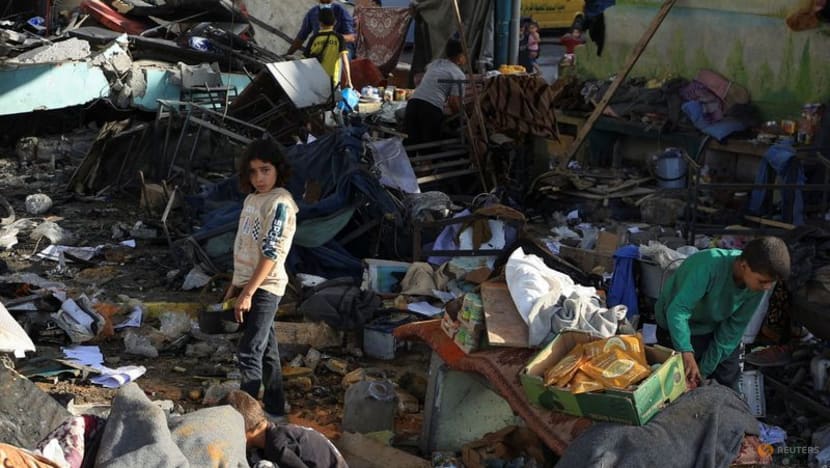US rejects suggestion that Hamas has agreed to a Gaza ceasefire proposal

Palestinian children inspect the damage at a school sheltering displaced people, following an Israeli strike, in Gaza City on May 26, 2025 (Photo: REUTERS/Dawoud Abu Alkas)
WASHINGTON: The US rejected on Monday (May 26) an assertion by Hamas that the group had accepted a Gaza ceasefire proposal that reportedly involves the liberation of 10 hostages in two batches and a 70-day truce.
A Palestinian official close to Hamas had said earlier it had agreed to a proposal by US special envoy Steve Witkoff for a Gaza ceasefire, which was received by Hamas through mediators.
A Hamas source told AFP that the group had "agreed to the new proposal" by the US, "which the movement received from mediators."
But reporting by Axios, confirmed to AFP by Witkoff's spokesman, said the US envoy disputed that the Palestinian militant group had agreed to his proposal.
"White House envoy Steve Witkoff rejects Hamas' claim that the group has agreed to his proposal for a hostage and ceasefire deal," Axios reporter Barak Ravid said on X.
He went on to cite the US envoy saying, "What I have seen from Hamas is disappointing and completely unacceptable."
ISRAEL RAMPS UP OFFENSIVE IN GAZA
The outline of a potential deal was revealed as Israel ramped up its offensive in the Palestinian territory, and follows previous rounds of talks that have failed to reach a breakthrough ever since a two-month ceasefire fell apart in mid-March.
The Hamas source said the deal included "a 70-day truce in exchange for the release of 10 hostages in two batches, and during the truce, negotiations would begin on a permanent ceasefire with American guarantees."
The United States, Egypt and Qatar have all had a hand in mediating the ceasefire talks throughout the war. Witkoff was involved in the negotiations that earlier led to the last ceasefire deal.
But the halt in fighting fell apart amid disagreements over how to move forward, with Israel resuming its operations in Gaza on March 18. On March 2, Israel imposed a total aid blockade on the territory that it said was aimed at forcing concessions from Hamas, with UN agencies since warning it has created critical shortages of food, clean water, fuel and medicines, amid warnings of looming famine.
It comes as Israel ramped up strikes in Gaza, including on Monday, when they killed people sleeping in a school-turned-shelter. The Israeli military said it was targeting militants.
Israel has vowed to seize control of Gaza and keep fighting until Hamas is destroyed or disarmed and exiled, and until the militant group returns the remaining 58 hostages, a third of them believed to be alive, from the October 7, 2023, attack.
Israel had blocked all food, medicine and fuel from entering Gaza for 2 1/2 months before letting a trickle of aid in as experts warn of famine, and pressure increases from some of Israel's top allies.
The Gaza Humanitarian Foundation said it has begun the distribution of food aid in Gaza with more aid trucks to be delivered on Tuesday, according to a statement. The US-backed private humanitarian organisation aims to distribute aid in Gaza through an Israeli-initiated plan. It has named John Acree as interim executive director after the resignation of its previous head over what he said was a lack of independence.
Hamas-led militants killed some 1,200 people, mostly civilians, and abducted 251 people in the October 2023 attack. Israel’s retaliatory offensive has killed around 54,000 Palestinians, according to the Gaza Health Ministry.















